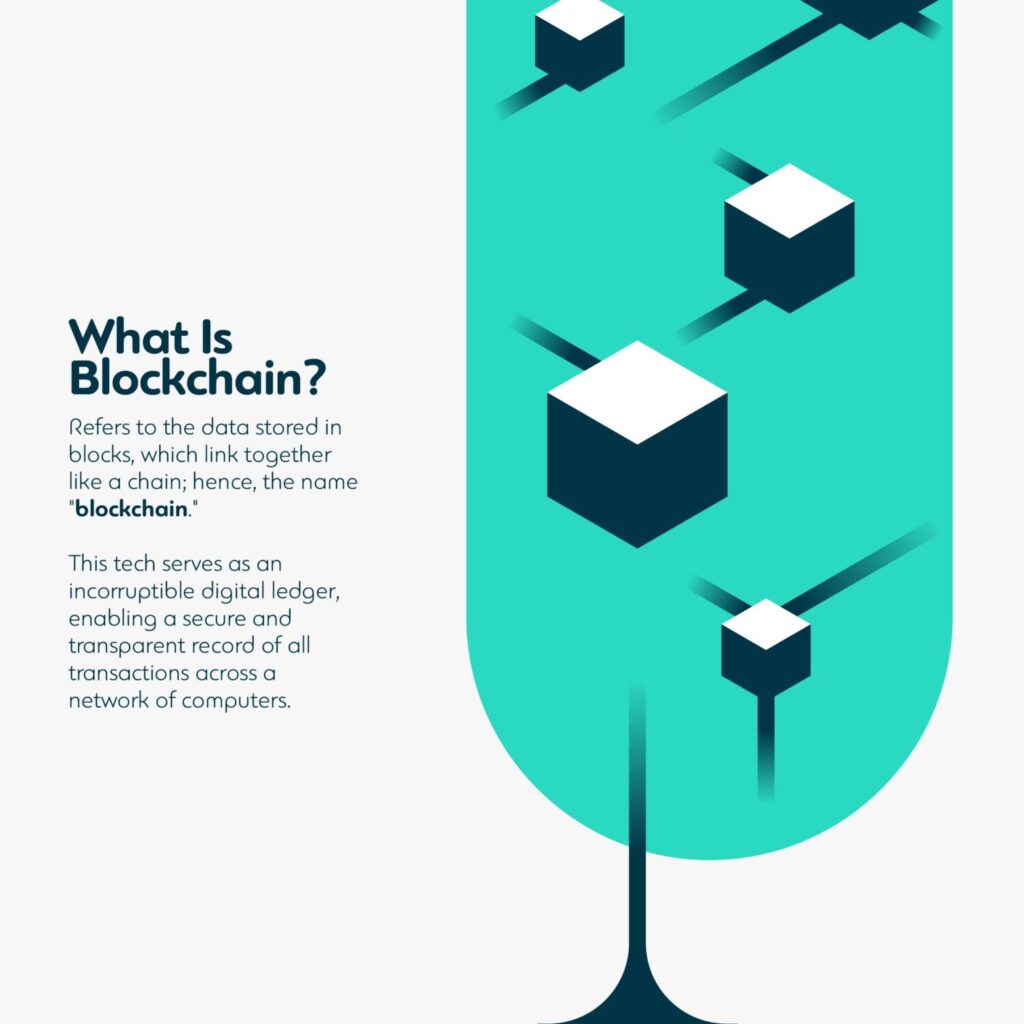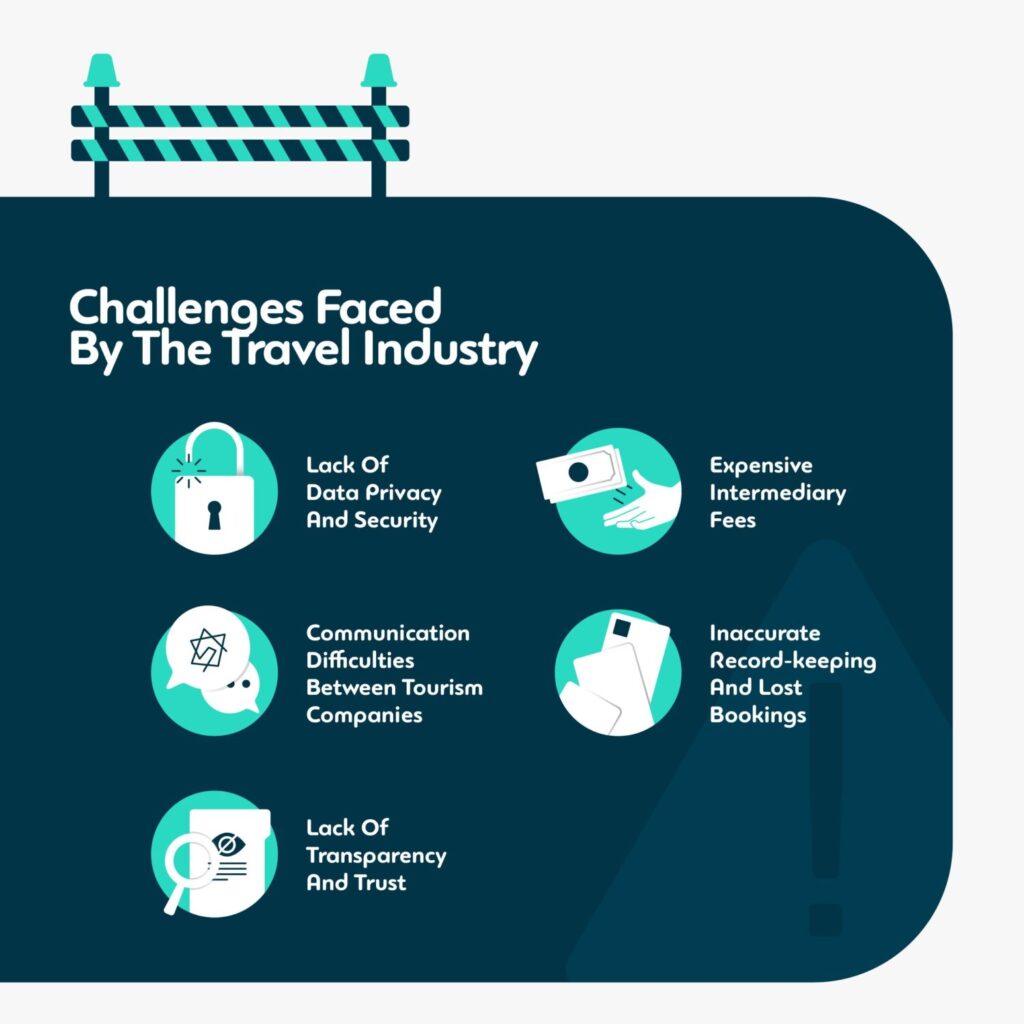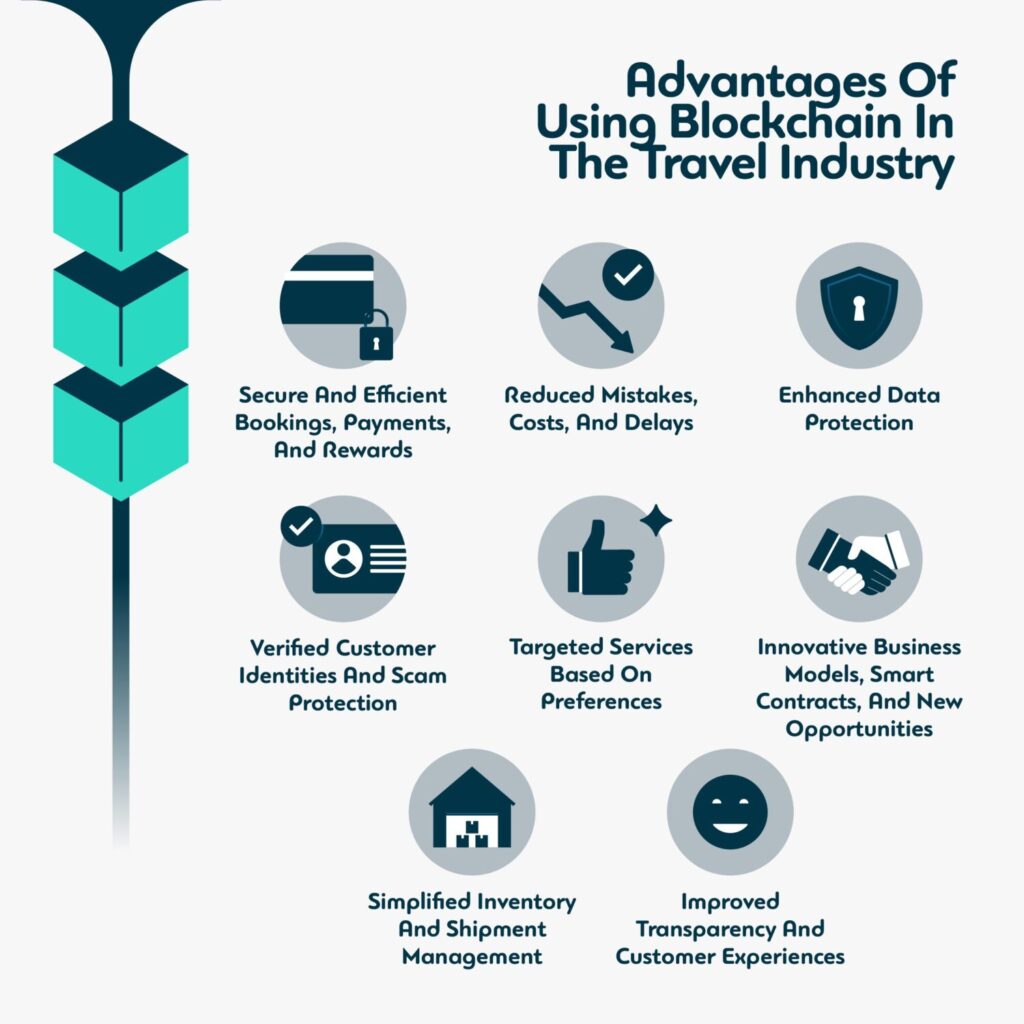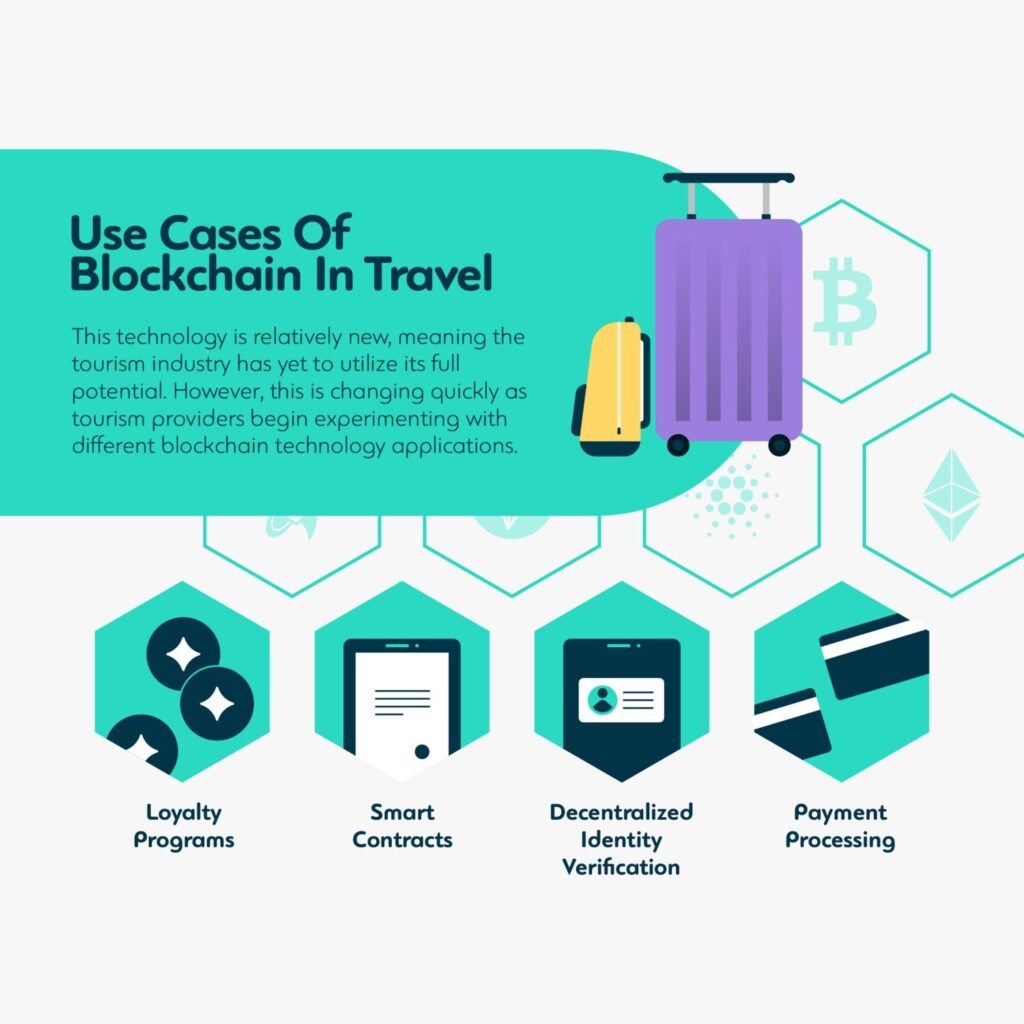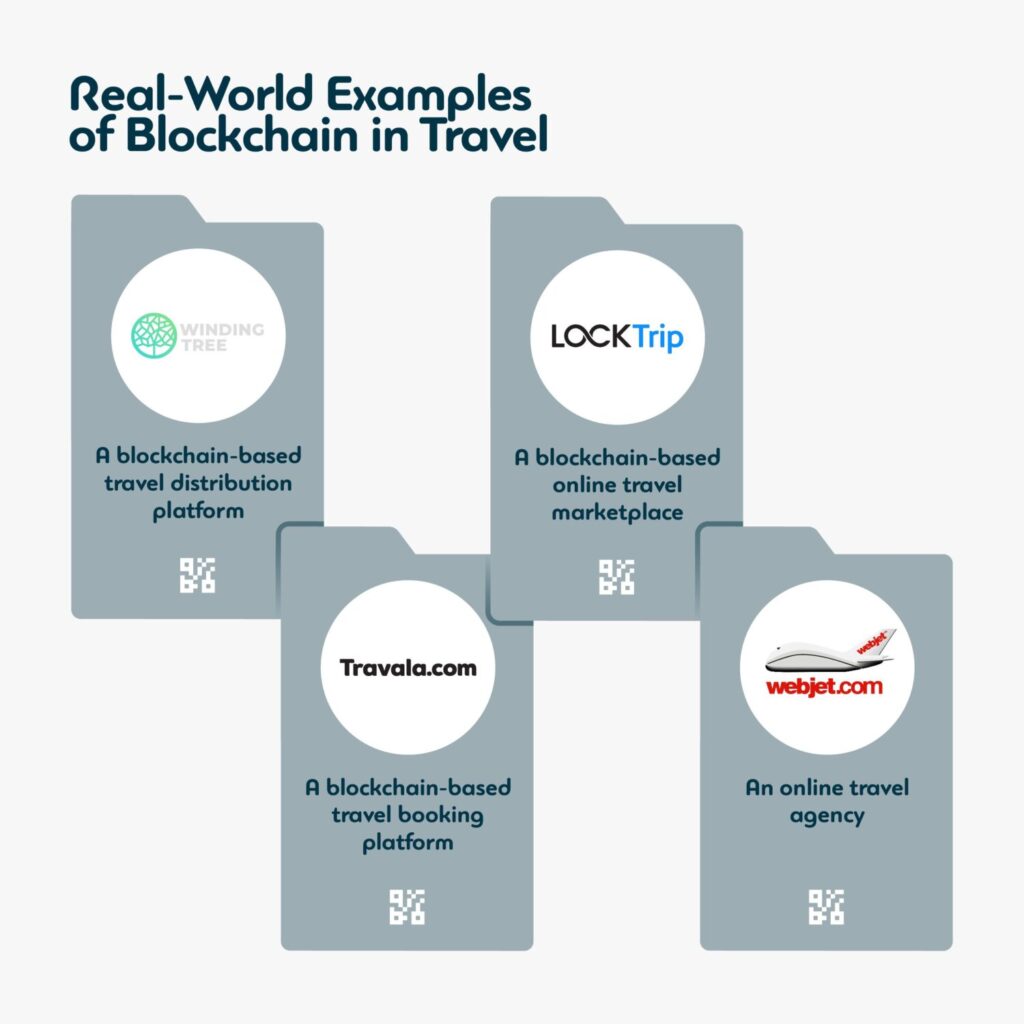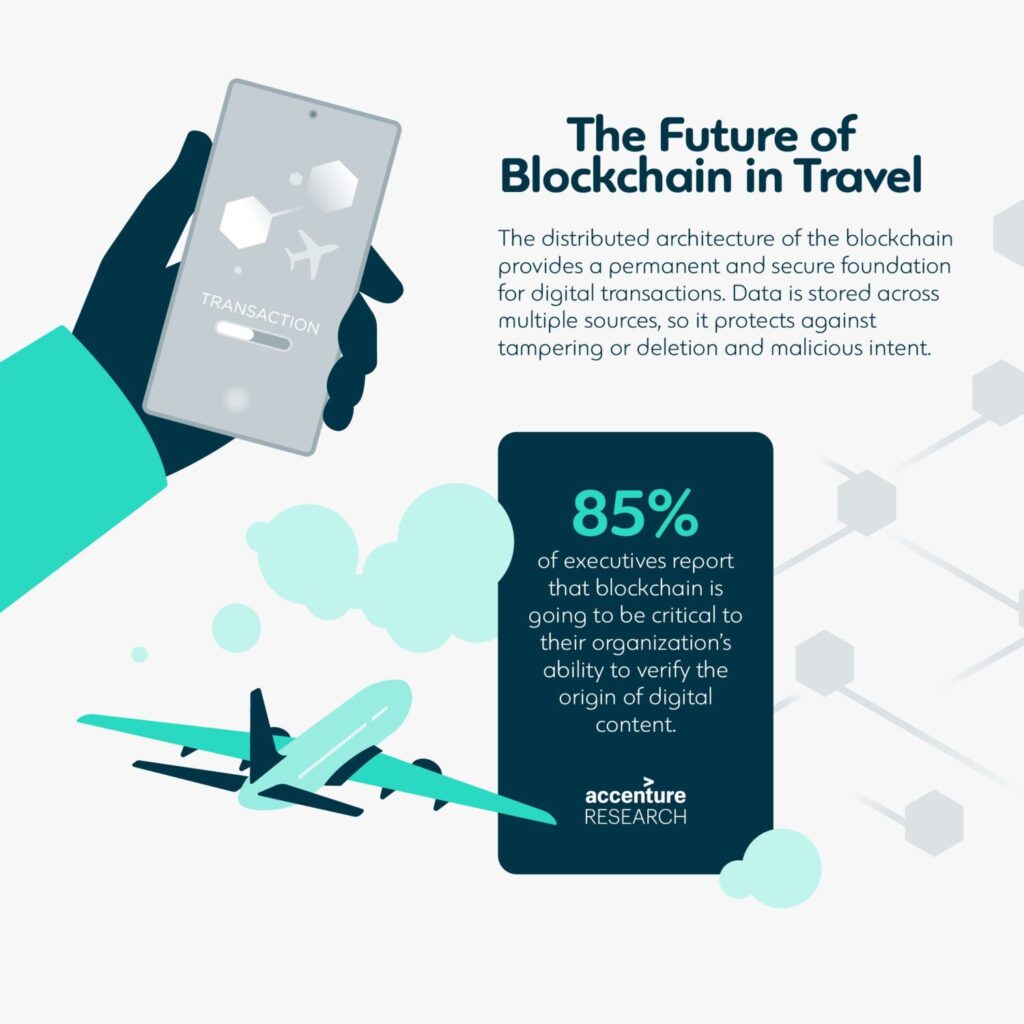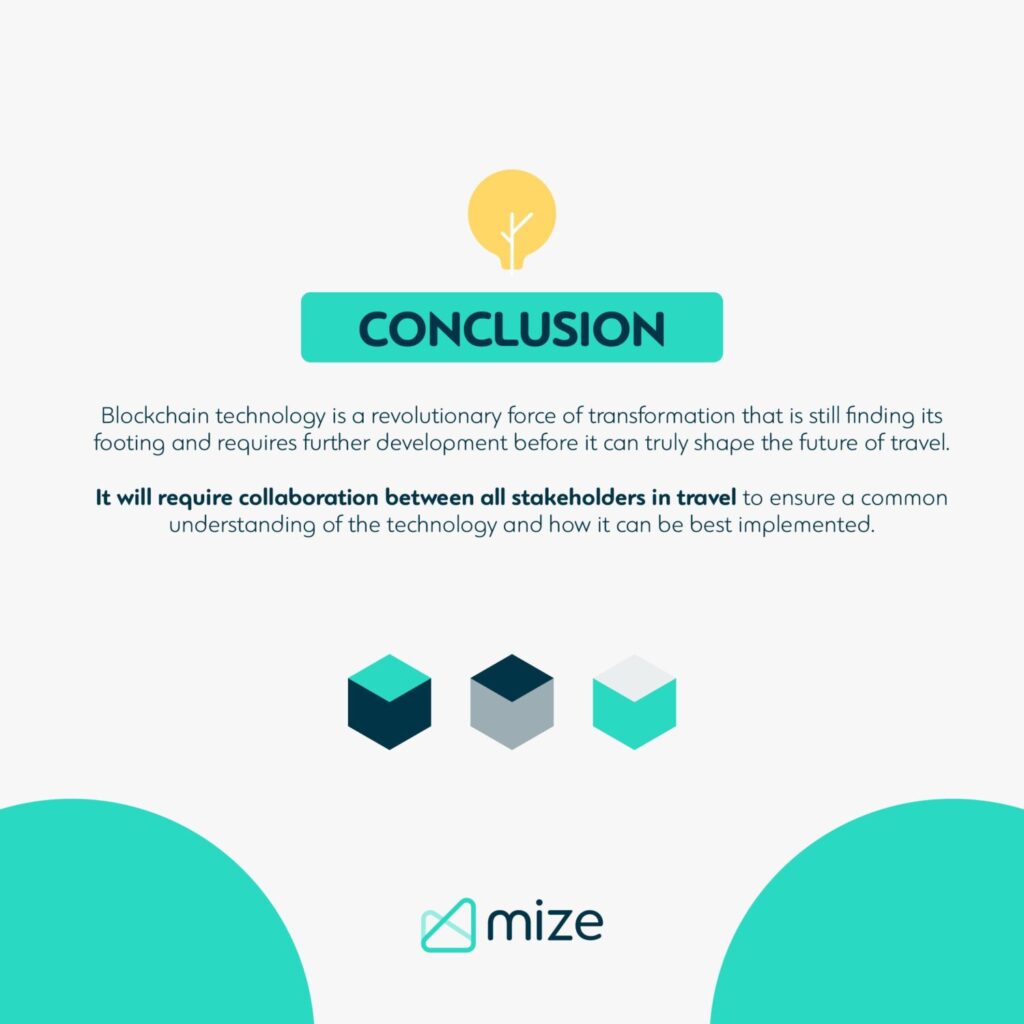Unlocking the Potential of Blockchain Technology in Travel

Blockchain technology has opened up the potential to revolutionize the travel and tourism industry, allowing businesses and travelers alike to benefit from the safety, security, and efficiency that Blockchain provides.
According to Informatics research, “In 2025, blockchain technology is expected to become a central component of business operations in the hospitality and tourism industry.”
As more businesses embrace this technology, travelers will find themselves able to experience their journey in an unprecedented way, from planning and booking to managing payments and rewards.
In this article, we’ll explore what Blockchain is and what it means for the travel industry. We’ll consider its opportunities and obstacles while providing numerous use cases and real-world implementations.
What is Blockchain?
Blockchain technology serves as an incorruptible digital ledger, enabling a secure and transparent record of all transactions across a network of computers. The data is stored in blocks, which link together like a chain; hence, the name “blockchain.”
Every block on the chain carries distinct information, like a digital signature ensuring its authenticity. Once it is included in the chain, its content cannot be changed or removed. This makes Blockchain a secure, efficient, and decentralized way to store data.
How Blockchain is Changing The Travel Industry
Blockchain technology has the potential to streamline complex processes, optimize data accuracy and increase transparency, making it an indispensable asset for those in travel, tourism, and the hospitality industry.
Simply put, it’s an opportunity to transform how people travel around the world.
Below we’ll explore the challenges encountered in the travel industry and how blockchain technology can be used to address them.
Challenges faced by the travel industry
The tourism industry is highly fragmented and often plagued with inefficiencies. From long transaction times to slow payment processes, the traditional travel system has needed an overhaul for some time.
Some challenges faced by the tourism industry include the following:
- A lack of customer data privacy and security
- Expensive intermediary fees and additional charges
- Difficulty in communicating across multiple tourism companies
- Inaccurate record-keeping, data management, and lost bookings
- A lack of transparency and trust between tourism companies, customers, and suppliers
Advantages of using Blockchain in the travel industry
Blockchain promises customers a more secure, streamlined, and seamless travel experience. By leveraging its technology, Blockchain can help reduce fraud, human error, and provide a secure platform for booking and payments.
Some advantages of using Blockchain in tourism include the following:
- Secure, efficient, and reliable bookings, payments, reservations, rewards, and loyalty programs
- Reduce mistakes, costs, and delays associated with travel and the stress they cause
- Blockchain-based systems make it difficult for hackers to access and alter sensitive information
- Companies can trustingly verify customers’ identities and protect against any potential scams
- Provide targeted services and advice to customers based on individual preferences
- Innovative models, lucrative streams of income, and new opportunities like smart contracts
- Keep a close eye on goods, simplifying inventory and shipment management
- Improved transparency resulting in enhanced customer experiences
Potential Challenges
While there are many challenges that blockchain technology can solve in the travel industry, it also comes with its own set of challenges.
Blockchain technology is still in its infancy and has yet to be widely embraced. This is because its potential applications and regulations are not yet fully understood.
The primary function of blockchain technology is to remove reliance on third-party intermediaries. This can significantly impact the performance of OTAs and tour operators.
If blockchain technology became the standard, customers could bypass OTAs and tour operators and connect straight to suppliers making intermediaries redundant. This is because blockchain technology is decentralized, meaning anyone can access it.
In order to remain competitive, OTAs and tour operators may need to modify their business models to incorporate blockchain technology.
This technology can provide many benefits, such as improved security, cost savings, and increased customer satisfaction. However, the costs associated with transitioning existing systems into a blockchain infrastructure can pose a high cost for many businesses to get started.
To become a mainstay in the travel industry, Blockchain would need to be adopted by the majority of airlines, hotels, and other service providers.
With its intricate nature, navigating and administering blockchain technology can be daunting for businesses lacking the necessary experience. However, with continued research and development, this could change in the near future.
Use Cases of Blockchain in Travel
This technology is relatively new, meaning the tourism industry has yet to utilize its full potential. However, this is changing quickly as tourism providers begin experimenting with different blockchain technology applications.
Let’s discuss a few of the potential use cases of blockchain in travel.
1. Loyalty Programs
Loyalty programs can be a great way to reward tourism providers for their loyalty, but they often require a lot of manual work and resources to manage on the user’s side.
A report from arrivia shows that “59% of millennials say it’s either extremely or very important to be able to redeem points or miles when planning a trip.” And “31% of industry leaders concede that conversion rates would improve if they offered more exclusive discounts.”
This presents tourism providers with the potential to use blockchain-based loyalty programs to create more engaging experiences and drive sales.
2. Smart Contracts
Smart contracts are digital agreements stored on the blockchain, allowing for reliable and secure agreements between tourism providers and travelers. This type of technology can be used to facilitate an end-to-end booking process and create trust between tourism providers and travelers.
These contracts are built to be automatically triggered when certain conditions are met, reducing the need for human intervention in the process. This helps eliminate discrepancies and provide relevant parties with accurate customer data.
Smart contracts offer many benefits, such as automatically issuing delays, cancellations, refunds, and verifying identities. By employing smart contracts, the travel industry can ensure faster, more secure, and more reliable agreements between tourism providers and travelers.
3. Decentralized Identity Verification
Decentralized identity verification allows users to securely verify their identity without relying on a central authority.
In addition to improved security, this solution enables faster data processing which helps reduce wait times for customer check-ins and other activities, ultimately leading to a better overall customer experience.
Allowing travelers to manage their digital identities better will enable data to be redistributed to the appropriate parties. This way, individuals have more control over their digital identities.
A decentralized identification system can also replace outdated identification documents like physical documents with more secure methods such as fingerprint and retina scans.
Through the Alastria project, a blockchain technology that leverages decentralized digital identification, tourist operations can streamline their tasks and have a centralized repository of all relevant customer information.
4. Payment Processing
Payment processing through blockchain technology has the power to revolutionize travel transactions and streamline payments.
For example, research conducted at the University of Raharja suggested that adopting cryptocurrency as a payment method could free users from extra charges on the platform.
Blockchain technology enables global ledger transactions that are fast, secure, and cost-efficient. This makes it an ideal option for payment processing in the tourism industry, where payments are often made across borders and at high volumes.
Blockchain can also enable the use of smart contracts for travel payments to ensure secure and automated transactions.
Real-World Examples of Blockchain in Travel
1. Winding Tree
Winding Tree is a blockchain-based travel distribution platform.
By leveraging blockchain technology, they link supply and demand, ultimately decreasing user costs and increasing supplier profits.
2. Travala
Travala is a blockchain-based travel booking platform.
By utilizing blockchain technology, they provide an accommodation booking platform that enables users to make payments in cryptocurrency in addition to traditional payment methods.
Travala is leveraging the power of decentralized technology to create a secure and transparent system for users to confidently book and pay for travel.
With their native cryptocurrency AVA, you can make payments, obtain loyalty rewards and receive refunds easily.
3.LockTrip
LockTrip is a blockchain-based online travel marketplace.
Their platforms are designed to save users up to 60% on their purchases while striving to make prices more affordable for the everyday consumer.
They offer a decentralized system to securely store, review and compare travel options before booking.
LockTrip empowers users to book their own travel while also benefiting from the savings they receive by cutting out intermediary costs.
4. Webjet
Webjet is an online travel agency.
They implemented blockchain into their operations by developing a system to record user entries on a blockchain ledger to help prevent disappointing booking experiences. As a result, opportunities for misplacing or mistaking bookings are greatly minimized.
By decentralizing data with blockchain technology, all parties can view current information and diminish supply chain flaws. This results in stress-free travel experiences, with cost savings being passed on to customers.
The Future of Blockchain in Travel
As consumers embark on their journey from planning to completing their trip, intricate business deals form as data flows between different companies in the travel industry.
This often results in a disconnect between various parties, from accommodation to flight bookings, leading to a lack of transparency in the travel process. The difficulty in monitoring resources has caused problems such as overbooking, cancellations, and refunds impeding real-time bookings.
The University of Raharja reported that “the utilization of blockchain innovation will make it simpler for organizations to keep secure information records.”
In order to reduce these occurrences, it is essential for both sides of the industry, from those booking travel plans to agents managing customer details to be able to seamlessly transfer data between each other at all times throughout the process.
According to research conducted by Accenture, “85% of executives report that blockchain is going to be critical to their organization’s ability to verify the origin of digital content.”
This enables all parties (travelers, agencies, and companies) to access up-to-date data on a decentralized platform. Technology like blockchain allows anyone to access up-to-the-minute information on available flights and rooms easily, eliminating the need for manual processes that have been inefficient and outdated for many years.
The distributed architecture of the blockchain provides a permanent and secure foundation for digital transactions. Data is stored across multiple sources, so it protects against tampering or deletion and malicious intent.
Conclusion
Blockchain technology is a revolutionary force of transformation that is still finding its footing and requires further development before it can truly shape the future of travel.
Blockchain can bring opportunities for the travel industry to streamline operations, create more secure systems, improve customer service and support, provide greater customer transparency and trust, foster closer relationships, and create new business models.
The challenges we face in achieving that reality will require collaboration between all stakeholders in travel to ensure a common understanding of the technology and how it can be best implemented.
Ultimately, blockchain will not only improve the efficiency of the travel industry but also open up new possibilities that were never previously thought possible. With its potential to revolutionize travel, blockchain technology will undoubtedly be one to watch in 2023.
Subscribe to
our newsletter
Yay! You are now
subscribed to our
newsletter
Mize is the leading hotel booking optimization solution in the world. With over 170 partners using our fintech products, Mize creates new extra profit for the hotel booking industry using its fully automated proprietary technology and has generated hundreds of millions of dollars in revenue across its suite of products for its partners. Mize was founded in 2016 with its headquarters in Tel Aviv and offices worldwide.
Related Posts
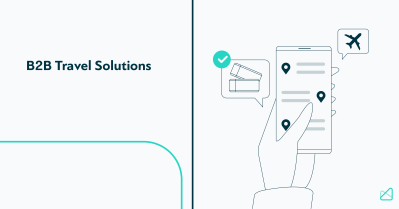
Your Ultimate Guide to B2B Travel Solutions
17 min. You’ve probably noticed that B2B travel solutions play a vital role in the global B2B travel sector. We are talking about the market bound to reach the size of $4952.96 by 2028. That’s a CAGR Growth of 17.51%. No wonder leading B2B travel solutions process over 80.000 bookings and 14.000 searches a day. […]
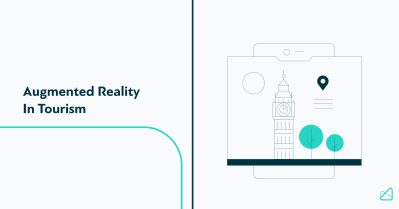
5 Ways Augmented Reality is Enhancing the Tourism Experience
20 min. Augmented reality (AR) can truly transform the way people discover and explore new places. By combining physical exploration with digital elements, travelers are able to gain deeper insights into different cultures while making memories along the way. In today’s world, more and more travelers are turning to technology to add excitement and convenience […]

Everything You Need to Know About Virtual Tourism Companies
24 min. Virtual tourism refers to a specific tourism niche using technology that enables travelers to experience activities, locations, and destinations without leaving their homes. The types of virtual tours depend on the multimedia format offered to travelers. It can be anything ranging from still images, video, and audio to interactive virtual reality. The popularity […]
